|
|
|
Sort Order |
|
|
|
Items / Page
|
|
|
|
|
|
|
| Srl | Item |
| 1 |
ID:
102729
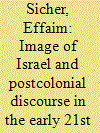

|
|
|
|
|
| Publication |
2011.
|
| Summary/Abstract |
The essay looks at three spheres in which ideological bias and political activism work to delegitimize the State of Israel by maligning Israel and Zionism in mainstream British public discourse. Postcolonial theory is one weight against any objective treatment of the Jewish state. The demonization of Israel in the press draws on conspiracy theories and stereotypes familiar from anti-Semitic tropes. British Jews are fairly supportive of Israel, though divided on solutions to the Arab-Israel conflict, however a small group of anti-Zionist Jews assert their moral stance "as Jews" by defaming Israel's allegedly criminal activities. The analysis of public discourse in Britain in the first decade of the twenty-first century raises disturbing questions about the complex relationship between the anti-Israel campaign and latent anti-Semitism on the left and the right, and draws attention to the local context of race relations as well as the global Jihad against Israel and the West.
|
|
|
|
|
|
|
|
|
|
|
|
|
|
|
|
| 2 |
ID:
151850
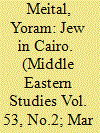

|
|
|
|
|
| Summary/Abstract |
This article is the first to expound on Chehata Haroun's personality, his beliefs, and the implications thereof, all of which will be scrutinized within the context of the national and political transformations that convulsed the Land of the Nile, especially its Jewish community, from the late 1940s onwards. For the most part, the emphasis will be on three strands of the activist's critical views of the Middle East. The first is his claim that the Zionist movement and the Arab leadership are jointly responsible for the asphyxiation of Egyptian Jewry. This argument was promulgated in a letter that he addressed to President Gamal ᶜAbd al-Nasser in February 1967. The second strand is that Haroun's Jewishness does not contradict his Egyptian national identity, his uncompromising devotion to communism and humanism, ardent opposition to imperialism, or his identification with the Palestinian cause. The third contention is that the Jewish community and its heritage constitute an indivisible part of the Egyptian social and cultural fabric.
|
|
|
|
|
|
|
|
|
|
|
|
|
|
|
|
| 3 |
ID:
102853
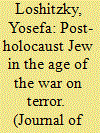

|
|
|
|
|
| Publication |
2011.
|
| Summary/Abstract |
As a film about "terror" spilling over from its local context (the struggle over Palestine) into the global arena, Munich transcends the specificity of the so-called "Palestinian question" to become a contemporary allegory of the Western construct of "the war on terror." The essay explores the boundaries and contradictions of the "moral universe" constructed and mediated by the film, interpreted by some as a dovish critique of Israeli (and post-9/11 U.S.) policy. Along the way, the author probes whether this "Hollywood Eastern" continues the long Zionist tradition seen in popular films from Exodus onwards, or signals a rupture (or even latent subversion) of it.
|
|
|
|
|
|
|
|
|
|
|
|
|
|
|
|
| 4 |
ID:
118536
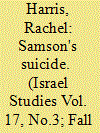

|
|
|
|
|
| Publication |
2012.
|
| Summary/Abstract |
Drawn from the biblical narrative, the image of Samson came to be used as a depiction of the self-sacrificing nationalistic ideal that dominated Zionist ideology. Though much has been said about the popular and widespread use of this image in Israeli society and culture, I contend that it was not solely his heroism, strength, and symbolic identity as the new Jew that marked this biblical figure for reuse in popular forums, but that his final suicide (martyred sacrifice) underpinned the drama of the Samson narrative. The symbolism of Samson soldiers willing to sacrifice themselves for the modern nation state altered as attitudes towards sacrifice for the collective changed. The heroism of the Samson myth collapsed, and subsequently was inverted, becoming a powerful tool for criticizing the Israeli military hegemony. This article traces a literary history of the changing narrative of the archetypal Samson.
|
|
|
|
|
|
|
|
|
|
|
|
|
|
|
|
| 5 |
ID:
133307
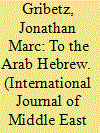

|
|
|
|
|
| Publication |
2014.
|
| Summary/Abstract |
To the Arab Hebrew [la-?ivriyah ha-?arviyah]! If you are a Hebrew, you are not an Arab. If an Arab, not a Hebrew. So, you are neither a Hebrew nor an Arab . . . C.Q.F.D." This paid announcement, published by an anonymous reader of the Jerusalem-based Hebrew newspaper ha-Tsevi on 27 November 1908, reminds us that the idea of an Arab Jew (or, in the parlance of Palestinian Hebrew in the early 20th century, an Arab Hebrew) has been at once present and contested from the early years of Zionist settlement in Palestine. Moreover, the contestation was (as it remains) often more emotional than logical (ce qu'il fallait démontrer notwithstanding). But the category of Arab Hebrew was not constructed simply to be attacked; for some, including another personal advertiser on the very same page of ha-Tsevi, Arab Hebrew was a self-proclaimed identity. "To M. M.," he or she wrote, "I saw you, I knew you, I respected you. I will leave you, I will remember you, and I will not forget you." This mysterious
|
|
|
|
|
|
|
|
|
|
|
|
|
|
|
|
| 6 |
ID:
137179
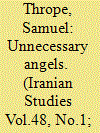

|
|
|
|
|
| Summary/Abstract |
The Škand Gumānīg Wizār (ŠGW) contains Middle Persian Zoroastrian literature's most extensive polemic against Judaism. This article explores the ŠGW's polemic in light of recent scholarship demonstrating the connection between Babylonian rabbinic Judaism and Zoroastrianism in late antique Iran. Taking this connection as a starting point, the article considers the ŠGW's critique of three angelic citations that are all closely paralleled by passages in the Babylonian Talmud. After demonstrating that the ŠGW citations depict angels as weaker and more oppressed than the rabbinic parallels, the article sets these portrayals of weakened angels in the context of the widespread belief among Jews in this period in Metatron, an angelic coequal to the divine. The article argues that the ŠGW's depictions of downtrodden angels are not borrowed from rabbinic polemics, found in the Talmud, against this theology, but is an independent reaction to the same belief in Metatron's co-regency, a belief that sources testify was still common in the early Islamic period. The ŠGW's motivating theological imperative to portray Judaism as radically monotheistic, and thus the binary opposite of Zoroastrianism, underlies the text's descriptions of angelic suffering and degradation.
|
|
|
|
|
|
|
|
|
|
|
|
|
|
|
|
|
|
|
|
|